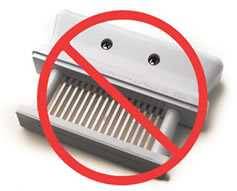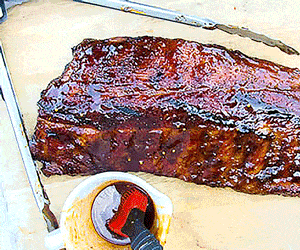YOU ARE HERE >> AmazingRibs » Ratings & Reviews » Ratings Reviews And Buying Guides » BBQ Tools Toys And Accessory Reviews » Kitchen Tools » Jaccard Blade Tenderizer Review
Jaccard Blade Tenderizer Review
All of our reviews are done independently by our team of testers and are in no way influenced by advertising or other monetary compensation from manufacturers. Click here to learn more about our unbiased product review process.
Published On: 5/22/2018 Last Modified: 10/30/2025

Don’t Use Jaccard Blade Tenderizers on Food That Will Not Be Cooked Beyond 160°F
These Jaccard Blade Tenderizers are designed to tenderize meat by slicing through tough fibers. You place the tenderizer on top of the meat and press it down, plunging thin blades into the meat. And, in the process, you plunge microbes on the surface deep into the interior. They work.
But there is a danger. A piece of meat often has contamination on the surface, but it rarely penetrates to the interior. When you cook, the flame pasteurizes it by killing everything on the exterior. If it has been worked on with a blade tenderizer, there is a much higher risk because the blades could essentially inoculate the interior by pushing in contamination on the surface.
To be safe, you need to cook the meat to more than 160°F. That means that if you are cooking to medium rare, 130°F, this device can be dangerous. On the other hand, if you are doing a tough cut such as beef short ribs or beef brisket, which are cooked to 180°F and above, you can use the jaccard, and in fact, I recommend it. You should also avoid commercial meats that have been blade tenderized if you intend to cook the meat to less than 160°F.

Click the buttons below to search our complete database of reviews:
Product Information:
-
Model:Jaccard Blade Tenderizers
-
Item Price :0.00
*Price Subject To Change
-
Meathead, AmazingRibs.com Founder And BBQ Hall of Famer - Founder and publisher of AmazingRibs.com, Meathead is known as the site's Hedonism Evangelist and BBQ Whisperer. He is also the author of the New York Times Best Seller "Meathead, The Science of Great Barbecue and Grilling", and is a BBQ Hall Of Fame inductee.


High quality websites are expensive to run. If you help us, we’ll pay you back bigtime with an ad-free experience and a lot of freebies!
Millions come to AmazingRibs.com every month for high quality tested recipes, tips on technique, science, mythbusting, product reviews, and inspiration. But it is expensive to run a website with more than 2,000 pages and we don’t have a big corporate partner to subsidize us.
Our most important source of sustenance is people who join our Pitmaster Club. But please don’t think of it as a donation. Members get MANY great benefits. We block all third-party ads, we give members free ebooks, magazines, interviews, webinars, more recipes, a monthly sweepstakes with prizes worth up to $2,000, discounts on products, and best of all a community of like-minded cooks free of flame wars. Click below to see all the benefits, take a free 30 day trial, and help keep this site alive.
Post comments and questions below
1) Please try the search box at the top of every page before you ask for help.
2) Try to post your question to the appropriate page.
3) Tell us everything we need to know to help such as the type of cooker and thermometer. Dial thermometers are often off by as much as 50°F so if you are not using a good digital thermometer we probably can’t help you with time and temp questions. Please read this article about thermometers.
4) If you are a member of the Pitmaster Club, your comments login is probably different.
5) Posts with links in them may not appear immediately.
Moderators